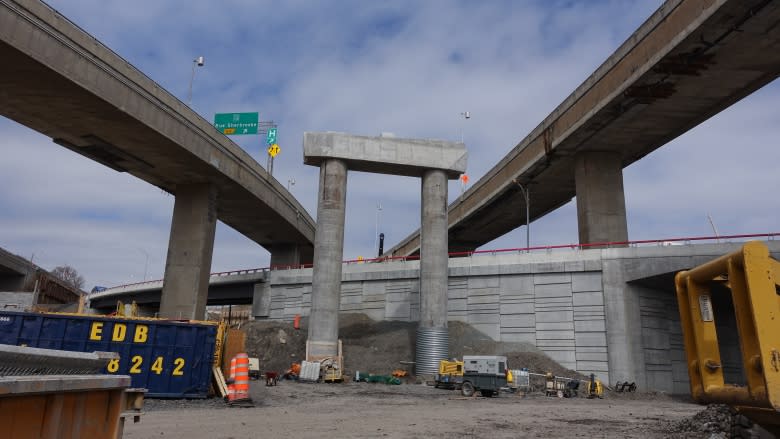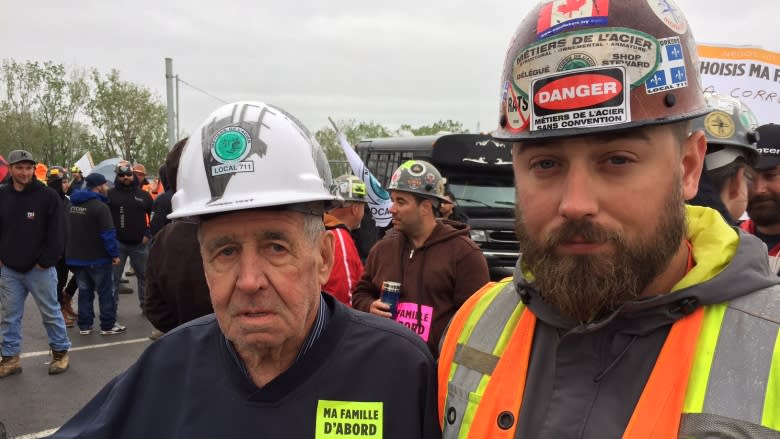Clock ticking as Quebec construction unions, employers resume negotiations
The two sides involved in Quebec's construction strike are back at the negotiating table as the government-imposed deadline to reach a deal by approaches.
Premier Philippe Couillard, who is in Israel on a trade mission, issued an ultimatum Thursday, saying that if no deal is reached by Monday, the government will table back-to-work legislation.
Also Thursday, Labour Minister Dominique Vien announced the addition of a fourth mediator to help facilitate the negotiation sessions. She urged the two parties to find a swift resolution to the labour conflict, saying the government won't let it drag on.
The ultimatum led parties to resume talks late Thursday into early Friday morning, focusing on issues like insurance, pension and leaves — but they failed to reach an agreement.
"Our best option is to find a win-win agreement before Sunday night," said Éric Côté, a spokesperson for the Association de la Construction du Québec, the group negotiating on behalf of employers.
Michel Trépanier, a spokesperson for the alliance of unions, agreed, saying labour groups do not want the provincial government to force them back to work.
"If it takes the whole weekend, it takes the whole weekend," he said.
About 175,000 workers have been off the job since talks broke down late Tuesday night, bringing work at construction sites across the province to a halt.
Too heavy-handed?
The provincial government said the strike, now in its third day, costs the Quebec economy $45 million every day it goes on.
While Couillard is prepared to call back the National Assembly to table back-to-work legislation, Parti Québécois Leader Jean-François Lisée claims the ultimatum goes too far.
"The ministry intervened much too late," he said Friday. "The premier is nowhere to be seen talking to the players now, trying to bridge a gap that is not that great, and so we say there are steps to be taken."
Liberal house leader Jean-Marc Fournier refuted Lisée's claims, saying negotiations have been underway for months with little progress.
Reports of hostility on job sites
The strike has led to tense confrontations between unionized and non-unionized workers, some of whom are still working.
General contractor Julien Greaves, who works in downtown Quebec City, said that one of his job sites was visited at least once by teams patrolling the city. His employees are not unionized.
He said if they see people working, they try to persuade them to stop.
If work continues, they threaten to call in buses full of people to do whatever they can to bring the work to a halt, Greaves said.
"If you want to work, you need to hide," he said. "It's wrong to stop people who want to work."
Greaves said while he's all for people fighting for what they believe in, in his opinion, construction workers in Quebec are well paid.
He said the prices he has to charge his customers in order to be able to pay his workers keep increasing.
"People keep asking [for] more and more and more. Where and when is it going to stop?"
The issues
Workers in the industrial sector are asking for more stable work schedules, while salaries are believed to be the main sticking point in the residential sector.
They are also asking for a pay raise of 2.6 per cent, which includes their pension and insurance. That raise is more than the rate of inflation, which is at 1.6 per cent, but Trépanier has said he believes that is a reasonable request.
Ironworker Mathew Fortin, picketing at the Champlain Bridge work site Friday, said he would be disappointed if the workers were legislated back to work without a deal.
"A lot of people think we're going on strike to get more conditions or more advantages, but it's not that. The reality is we just want to keep what we have," he said.
Fortin was there with his grandfather Claude Petit, who also worked in construction, though he is long since retired.
Petit said when he started working in the 1950s, he was paid double time to work on weekends, but that is no longer the case.
He said it seems workers' rights are going backward, not forward.
Work on the Champlain Bridge is one of a number of projects that have been affected by the strike. A work blitz planned for this weekend has been cancelled.
This is the second general strike in the Quebec construction industry in four years



